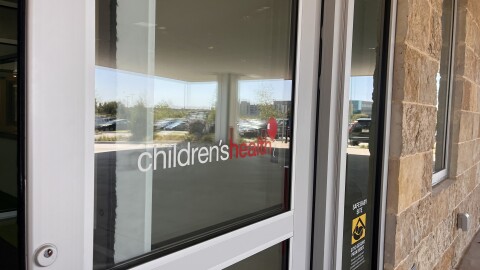-
Outgoing Metrocare CEO reflects on time with community mental health center, future of care in TexasDr. John Burruss, CEO of Dallas County's largest behavioral health provider, is set to retire at the end of April after over a decade with the organization. He spoke with KERA's Abigail Ruhman about his time with one of the busiest community mental health centers in Texas and the future of mental health care.
-
Attorney General Ken Paxton has filed a lawsuit against Children's Health System of Texas and a Dallas doctor for allegedly violating Texas laws that bans health providers from treating transgender youth with gender-affirming care.
-
A total of five cases have now been confirmed, the county's health authority said. All individuals live in the same household.
-
The Fight Against Suicide, started at the University of Georgia, has expanded to eight schools including TCU.
-
Texas Medicaid is facing calls for stronger anti-fraud measures. The state Medicaid director said her office is taking steps to address potential fraud, but isn't responsible for investigations.
-
Texas Supreme Court justices appeared skeptical that a woman who regrets her gender transition can't sue her therapist.
-
Texas proposed increases to Medicaid reimbursement rates for certain ambulance services. During a public rate hearing, providers said the higher rates could help maintain access to critical services, especially in rural areas.
-
The city has called a special election for May 2 to ask voters whether they want a citywide telehealth program.
-
An allergist in Dallas explains the winter allergies that can result from too much time indoors during winter storms, and why some people are allergic to cold weather.
-
A majority of Texas' uninsured children are Latino, according to new analysis from the nation's largest Hispanic civil rights and advocacy organization. The report also found most uninsured children are eligible for public insurance or financial assistance through the federal health insurance marketplace.
-
‘We need it now more than ever’: How a drag pageant supports LGBTQIA+ health services in North TexasAnti-LGBTQIA+ legislation and policy changes have left queer and transgender Texans to navigate a changing political and social landscape. Despite growing fear and concerns, some drag queens want to focus on advocating for queer joy and health. Performers said the role of an annual drag pageant in North Texas is becoming more important.
-
A Dallas cardiologist explains how this form of chest pain differs from a heart attack, and how you can prevent it from occurring.
-
Last year, Gov. Greg Abbott vetoed funding for a summer food assistance program despite Texas’s high rates of food insecurity, citing concerns over matching federal funds. Advocates want the state to reconsider, highlighting concerns about how food insecurity rates are expected to increase when students are on summer break.
-
More than half of Texas adults have experienced physical violence in their lifetime, according to the first comprehensive statewide survey. The Texas Violence Experiences Survey also found economic shocks, like eviction and loss of employment, have a strong correlation with recent experiences of violence.

















